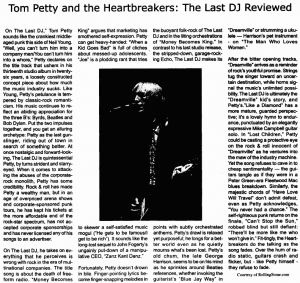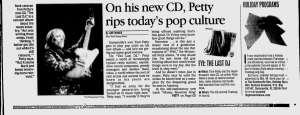Tom Petty and the Heartbreakers | The Last DJ (Warner Bros.)
By Robert Wilonsky
Dallas Observer - October 3, 2002
Tom Petty's as pissed as a millionaire gets, meaning you'd best take this (ahem) concept album about rock-and-roll corruption with a grain of salt the size of Mike Campbell. What happens when this album, financed by a multinational, gets airplay? Will it be considered victory or surrender, ironic or just inevitable? Because what you'll find here is hardly an act of insurrection, the clarion call of the revolutionary out to gut the mutts on his way to storming the castle; let's talk when he starts paying for the sessions out of his own back pocket, when he starts funding his own tours and returning his own phone calls instead of using the outside PR man as a shield. Besides, strip off the words and you're left with TP and the HB tried and true and then some--the same ol' same ol' from a man and a band who confuse "new" with "most recent"; you own this record and have since, oh, 1986. Still, better populist rock than pop rock, right? Admire the anger; revel in the vitriol. It's not that Petty's wrong; never has been, save for that anti-doper anthem that somehow failed to alienate the fan base (I know--they were too stoned to notice). Right, right, there's plenty to be pissed at: Radio stations hire consultants, "celebrate mediocrity" and turn their jocks into whores only too happy to take money from labels. Concert tickets cost way too much, and bands are delighted to sell their songs and souls to lite-beer commercials ("Money Becomes King"). Label execs are little more than svengalis eager to shape some hot young thing into the Next Big Thing ("Some angel whore/Who can learn a guitar lick/Hey, that's what I call music") in the name of corporate contentment ("Joe," which should have been titled "Randy Newman"). Ours has become a vacant and complacent culture that has rendered our youths little more than characters in a violent video game ("When a Kid Goes Bad," "Lost Children"). Yup, dude--it all sucks and only gets worse from here, and what's a poor rock star to do about it except sing about it and hope critics write about it so people will buy it so the label can pay for it, till the vicious cycle starts all over again after he gets done touring Afghanistan and handing over the proceeds to musicians' health-care trust funds. Did I mention it sounds like every other Tom Petty record? Well, it does.
Tom Petty and the Heartbreakers: The Last DJ Reviewed
The Racquet - October 3, 2002
On "The Last DJ," Tom Petty sounds like the crankiest middle-aged punk this side of Neil Young. "Well, you can't turn him into a company man/You can't turn him into a whore," Petty declares on the title track that ushers in his thirteenth studio album in twenty-six years, a loosely constructed concept piece about how much the music industry sucks. Like Young, Petty's petulance is tempered by classic-rock romanticism. His music continues to reflect an abiding appreciation for the three B's: Byrds, Beatles and Bob Dylan. Put the two impulses together, and you get an alluring archetype: Petty as the last gunslinger, riding out of town in search of something better. At once nostalgic and forward-looking, The Last DJ is quintessential Petty, by turns strident and starry-eyed. When it comes to attacking the abuses of the corporate-rock monolith, Petty has some credibility. Rock & roll has made Petty a wealthy man, but in an age of overpriced arena shows and corporate-sponsored punk tours, he has kept his tickets are the more affordable end of the rock-star spectrum, has not accepted corporate sponsorships and has never licensed any of his songs to an advertiser.
On The Last DJ, he takes on everything that he perceives is wrong with rock in the era of multinational companies. The title song is about the death of freeform radio. "Money Becomes King" argues that marketing has smothered self-expression. Petty can get heavy-handed: "When a Kid Goes Back" is full of cliches about messed-up adolescents. "Joe" is a plodding rant that tries to skewer a self-satisfied music mogul ("He gets to be famous/I get to be rich"). It sounds like the long-lost sequel to John Fogerty's ungainly put-down of a manipulative CEO, "Zanz Kant Danz."
Fighting the Good Fight
By Jim Farber
New York Daily News - Sunday, October 6, 2002
Back with a new LP, Tom Petty rips into the corruption of pop culture
Tom Petty gets to play pop critic on his new album and he's not giving out many good reviews.
On "The Last DJ," Petty paints a world of increasingly cynical radio stations, exploitative record companies, greedy managers and shallow musicians, a world where the sort of real artists and earnest fans he knew in his youth are marginalized.
"I feel so sorry for the younger generation being turned on to music right now," Petty says. "I wonder if they're being offered anything that's that good. Or if they even know how good things can be."
Petty on music's 'angel whores,' greedy execs
By Tom Moon
The Philadelphia Inquirer - October 6, 2002
Is America willing to spend its hard-earned cash to hear a rock star rail about how craven pop culture has become? Tom Petty is about to find out.
On his acidic concept album The Last DJ, which arrives Tuesday, the famously laid-back, Florida-born rocker bemoans an entertainment industry that markets soft-porn "angel whores" and executives whose mantra is "You get to be famous, I get to be rich."
In songs plainspoken and devastatingly direct, Petty laments the corporatization of radio and the greed that stunts artistic careers, the worship of false American Idols, and the profit-at-any-cost orientation that derailed Enron and, he believes, exists throughout the business world.
"It's reached absurd levels," Petty said last week of the cynicism that pervades the entertainment industry. "When you're creating your pop stars on a game show on TV, you know something's wrong. Not only are you really insulting people who have put their [lives] into their art," he said, but it cheats the audience.
More than Petty gripe
By Joel Selvin
The San Francisco Chronicle - October 6, 2002
Venerable musician is again making waves -- and sense
Tom Petty is mad as hell and he is not going to take it anymore.
He calls his new album, "The Last DJ," a "loose concept album" where Petty blasts corporate greed in the Clear Channel era of the music business on sharp, pointed songs like "Dreamville," "Money Becomes King" or the title track with the ringing chorus "there goes the last DJ who plays what he wants to play and who says what he wants to say."
"I'm fed up with the world," Petty said. "I'm not really attacking the music business. That would be like shooting fish in a barrel. It would be too easy a target. I use them more as a metaphor for what's going on everywhere, in all the businesses, in all our lives. There's just this missing element of truth. Perhaps there's a little bit of a moral dilemma. That might be more of what I'm trying to say in general. We've hit a point where I'm not sure we care about each other. I miss that."
Tom Petty lays out his case in song
By Tom Moon
The Baltimore Sun - October 8, 2002
Is America willing to spend its hard-earned cash to hear a rock star rail about how craven pop culture has become? Tom Petty is about to find out.
On his acidic concept album, The Last DJ, which arrives today, the famously laid-back Florida-born rocker bemoans an entertainment industry with executives whose mantra is, "You get to be famous, I get to be rich."
In songs plainspoken and devastatingly direct, Petty laments the corporatization of radio and the greed that stunts artistic careers, the false worship of American Idols and the profit-at-any-cost orientation that derailed Enron and, he believes, exists throughout the business world.
"It's reached absurd levels," Petty said of the cynicism that pervades the entertainment industry. "When you're creating your pop stars on a game show on TV, you know something's wrong. Not only are you really insulting people who have put their [lives] into their art," he said, but it cheats the audience.
Nudist Group: 'Tom Petty: We Want You ... Naked"
NCBuy - October 8, 2002
Kissimmee, FL -- Members of a nudist group says they want to take off their hats -- not to mention the rest of their clothes -- to Tom Petty.
Erich Shuttauf of the American Association for Nude Recreation says his organization is overjoyed Petty has been telling talk show hosts like Katie Couric that his new record, "The Last DJ," "is perfect for dancing naked around the house."
Shuttauf says because of this, the AANR is offering an open invitation for "nude-recreation-friendly" Petty to play at an upcoming meeting of the board of trustees Nov. 19-23.
Members would be delighted if Petty played -- especially in the nude -- but if he can't make it, he's invited to any other club sanctioned event he'd wish to attend.
Also, Shuttauf says it's personal for him, because he's been "dancing naked to Petty in his own bedroom since high school."
Petty's "The Last DJ" hits stores today (Oct. 8).
Petty Strikes Gold by Panning Greed Of The Music Biz
By Jim Abbott
Orlando Sentinel - October 8, 2002
There's already a long list of rock stars who have tilted at the windmill of the music industry's stifling corporate structure, but the topic is more timely than ever in this era of bottom-line media consolidation.
Unfortunately, even the most articulate rants can grow tiresome to fans, like listening to millionaire athletes demand more money.
That makes The Last DJ, Tom Petty's 30th studio album (in stores today), an inspired anomaly for looking at the issue from the cheap seats rather than the back of a limo. Occasionally, the rhetoric still sounds strident, but it's obvious that Petty and the Heartbreakers remember and honor rock's irreverent spirit.
On his new CD, Petty rips today's pop culture
By Jim Farber
Gainesville Sun - October 9, 2002
Gainesville's own Tom Petty gets to play pop critic on his new album -- and he's not giving out many good reviews.
On "The Last DJ," Petty paints a world of increasingly cynical radio stations, exploitive record companies, greedy managers and shallow musicians, a world where the sort of real artists and earnest fans he knew in his youth are marginalized.
"I feel so sorry for the younger generation being turned on to music now," Petty says. "I wonder if they're being offered anything that's that good. Or if they even know how good things can be."


